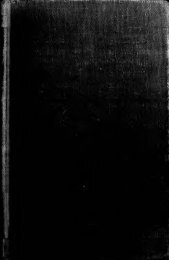Ecclesiastes - GA Barton - 1908.pdf
Ecclesiastes - GA Barton - 1908.pdf
Ecclesiastes - GA Barton - 1908.pdf
Create successful ePaper yourself
Turn your PDF publications into a flip-book with our unique Google optimized e-Paper software.
AUTHOR'S INTRODUCTION, OR PREFACE [Cn. !- 71<br />
The word for " panting" in Heb. is used of the panting or snorting<br />
of animals. Cleric long ago perceived that Qoheleth was thinking<br />
of the chariot of the sun as drawn by panting steeds, as in Ovid,<br />
Metam. XV, 418^". and Virgil, Georg. I, 250. Kn. and Wr. object<br />
that such an idea is entirely un-Hebraic and consequently impos-<br />
sible. Ha. has, however, pointed out that 2 K. 23" shows that<br />
even before the exile the Israelites were familiar with it. The<br />
comparison of Ps. 19* (Kn. and Heng.) is inapt. Qoheleth 's<br />
mood is very different from that of the psalmist.<br />
6. Circling, circling goes the wind]. The movements of the wind,<br />
as well as of the sun, present a similar series of endless, wearisome<br />
repetitions. North and south only are mentioned probably because<br />
east and west were mentioned in the preceding vs. (so<br />
Gins.). PL's suggestion that they are alone mentioned because<br />
north and south winds are the prevailing currents of air in Pales-<br />
tine is erroneous. The Palestinian winds are mostly from the<br />
west, and are quite as likely to be from the east as from the north<br />
or south.<br />
7. All the streams]. As a third example from nature, Qoheleth<br />
takes the fact that the streams all continually^^ into the sea with-<br />
out filling it. Their ceaseless work accomplishes nothing.<br />
8. All things are wearied]. The wKole universe groans with man<br />
because of its useless and monotonous activity. The last two<br />
lines of the verse may be interpreted in two different ways,<br />
(i) With Gr., PL, No. and Ha. it may be taken to mean that neither<br />
the eye nor the ear of man is able to take in all this weariness.<br />
This interpretation ignores, however, the literal meaning of the<br />
words, and gives them a sense derived from the context. (2) Wr.<br />
takes the words in their natural sense, understanding them to<br />
mean that the meaningless rounds of nature communicate them-<br />
selves to the spirit of man, so that eye and ear enter upon endless<br />
courses of seeing and hearing that never satisfy.<br />
the more probable interpretation.<br />
This last seems<br />
9. What has been is that which shall be]. This is a general statement<br />
of the fact that all things move in constant cycles. The<br />
fact has been illustrated in preceding verses by a few striking ex-<br />
amples. 10. Already was it]. This anticipates<br />
and answers an ob-





